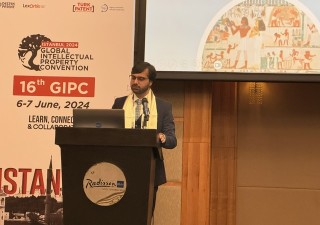Global Experts Share Tips on Negotiating IP Deals
28 January 2014

Experts from China, Japan, the United States and Europe gathered in Hong Kong to share tips for licensing in and licensing out technology, highlight legal traps to unwary licensors and licensees and provide practical guidelines on the dos and dont’s of the negotiating process. The seminar, Negotiating an International IP Deal, was sponsored by CPA Global and jointly organized by the Licensing Executives Society China Hong Kong sub-chapter (LESC-HK) and the Hong Kong Trade Development Council.
Johnson Li, an attorney at law at China Patent Agent (HK) in Beijing, said that more Chinese value the importance of IP nowadays. “However, the negotiation process is culturally different from the west. For example, Chinese like to bargain, whereas almost everything has a fixed price in the west, which makes negotiation difficult. Clients should keep their contracts short and concise and, even better, draft good Chinese versions.”
Debra Ashley, a lead lawyer at CPA Global in Gurgaon, discussed the technology licensing aspect in Europe and she reminded participants that “when a licensor lets people download its software for a fee, it is an outright sale, not licensing, so licensors cannot sue for infringement. If licensors want to sue, they first cannot charge single payments. Second, they need to limit their contract terms and conditions.”
Yorikatsu Hohokabe, a senior advisor at Oblon, Spivak, McClelland, Maier & Neustadt in Tokyo said that Japanese are reserved and shy with what he called “Galapagos syndrome,” or selfsufficient thinking. “Unlike the US, a Japanese negotiator might not have the power to make a decision since Japan focuses on teamwork.”
The US, on the other hand, handles things the opposite way. “The US has a litigious culture with lengthy documentation and complex legal system,” said Jocelyn Cho, vice president of global legal at Barclays in California. “Unlike Japan, consensus decision is less common in the US and, more importantly, while the Asian cultures prefer quiet listening in meetings, interruption is expected among Americans to show engagement but not disrespect.”
MS Bharath, a partner at Anand and Anand in Chennai concluded the seminar with a panel discussion. He said that parts of the culture in India are similar to China, as Indians love to bargain. He also said that enforcement has been easier recently since everything is now online and, more importantly, “most Indian courts have mediation centres and courts encourage people to pursue mediation first.”
Approximately 70 IP professionals attended the seminar. Three University of Hong Kong students, Brian Chu, Kate Chan and Larissa Tse, were presented first prize for the second Asia-Pacific Student Business Plan Competition.






